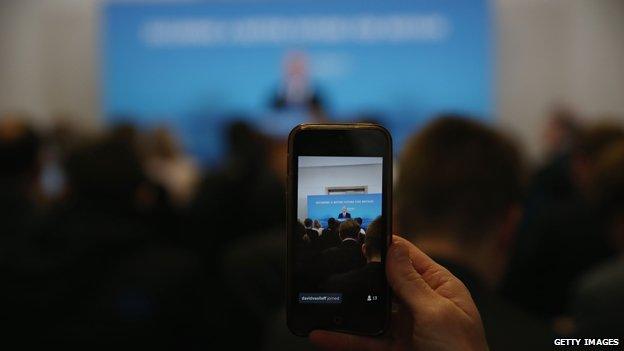Election 2015: It wasn't social media 'wot won it'
- Published
- comments

Five years ago, in the aftermath of the 2010 election, it became the received wisdom that next time things would be different.
Technology and in particular social media would play a key role in the 2015 campaign. Twitter and Facebook would become vastly more influential than newspapers in spreading election messages, and sentiment analysis - mining the big data of social media - would tell us exactly what was going on. How wrong that turned out to be.
Sure, there was vastly more social media activity, and the news cycle was accelerated as campaigners used Twitter to debunk their opponents' gambits within minutes. Ed Miliband had hardly unveiled his tablet of stone before the hashtag #edstone was a trending topic.
Five years ago, Twitter was something shiny and new for politicians, and even using Facebook was regarded as something quite frivolous by many - but both were obsessively used this time. And despite the much greater noise about Twitter, I suspect that Facebook was a much more important platform for reaching voters. Certainly, that was where the Conservatives spent a decent chunk of money.
If you wanted to get first news of every move in the campaign, or indulge in passionate debate with people who had a different view of politics, then tapping away at an app on your smartphone was the thing to do.
But for the most part, social media followed the campaign rather than led it. The running was made by those old dead-tree newspapers which proved, whether Twitter liked it or not, that they could still punch above their weight. And after a result that confounded both the pollsters and the Twitterati, many are concluding that social media platforms are just giant echo chambers where voters have their prejudices confirmed rather than challenged.
What though of the science of sentiment analysis? During the 2010 campaign, I was bombarded with press releases from companies claiming they could chew through the data from Twitter and Facebook and reach conclusions about who was faring best. When the results were in, it was seen that they'd failed, overestimating the Liberal Democrat vote by a wide margin.
This time, with more than 30 million Britons on Facebook and 15 million on Twitter, it seemed they had a better chance. Here was the opportunity for Big Data to show its mettle. Indeed one software consulting company boasted of its app which would "showcase uses of its Big Data technologies", using "contextual analytics" to provide insight on "the sentiment and frequency of Twitter conversations" about the election.
When I asked this morning for examples of where sentiment analysis had proved a useful predictor of voting patterns, the company behind that app returned with a blizzard of charts. Extracting any kind of conclusions from the data was almost impossible. What should we make, for instance, of the fact that Ed Miliband got more mentions than David Cameron on Twitter? Or that UKIP was the most talked about party?
But I also heard from Elections UK, a joint venture between Warwick University, City University and a Greek research institute that had success in using Twitter data to predict the recent election there, external. They bravely sent me their prediction, made at 1400 on election day, which combined Twitter data with opinion polls to reach a conclusion. And guess what? Just like the polls, it put Labour and the Conservatives neck-and-neck.
Twitter itself also got in touch to tell me that David Cameron had been the most-mentioned party leader this year, Conservative MPs had tweeted more than their Labour rivals over the last three months, and there was evidence that Twitter had encouraged more young people to vote.
So it seems that there is now a vast amount of data available to those wishing to look into the minds of British voters, but the techniques employed to examine that information and extract some meaning from it still need some work. Across the political spectrum many are convinced that technology can now play a huge role in an election campaign - but they are still puzzling over just how to use it effectively.